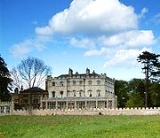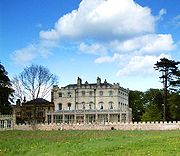
Castle Eden
Encyclopedia
For the similarly named castle in Aberdeenshire, see Eden Castle
.
Castle Eden is a village in County Durham
, in England. It is situated a short distance to the south of Peterlee
, Wingate
, the A19
and Castle Eden Dene
. The village is famous for the former Castle Eden Brewery which was home of the famous Castle Eden Ale; most of it was demolished in 2003 for a new housing estate and only the main front building remains today. This is a listed building and is now managed office space with a popular Italian restaurant. The A19 used to run through the village until it was bypassed in the 1970s. The deep and impressive nearby dene extends all the way to sea and its many Yew trees are a particular feature where they find the magnesian limestone
soil advantageous.
and the King's Book record Castle Eden as a small village, but make no mention of any castle. In 1764, the estate of Castle Eden was purchased by Rowland Burdon from William Turner, in which the deeds describe a pathway passing a ruined medieval chapel across a bridge and through the village leading up to the ruined manor and castle. It is commonly considered that this is the area named "The Village" and that the present Parish Church of St. James (Parish of Monk Hesleden
) is built on the site of the chapel mentioned.
In the 1760s, a farm labourer digging out a hedge discovered a fine glass beaker, known as "The Castle Eden Beaker". It now resides in the British Museum
.
 Rowland Burdon returned to the estate in 1766 to work on "The Castle"
Rowland Burdon returned to the estate in 1766 to work on "The Castle"
as it became named, adding the present Regency
Gothic
wing. Sir John Soane
, renowned Regency architect, visited the completed castle on his way from another project. He drafted plans, proposing a potential Neoclassical
remodelling of the structure. Burdon in the end chose not to commission him.
The Nimmo family would go on in 1826 to found what would come to be known as the Castle Eden Brewery, trading as J. Nimmo and Son Limited. Other families such as the Savilles owned their rope works and bleachery for sail cloth manufacturing, making the village, at the start of the 19th century, a fairly industrious one. However, as with so many similar sites, as the Victorian era
moved on, so did much of the industry.
In the course of the 19th century, the by now much expanded, but still lowly populated and spread out village, acquired a railway and railway station, a police station and a magistrates' court. These were all closed in the 1960s and their buildings demolished. The village also had its own primary school which closed in the 1970s.
Until the 1980s, the village still had a post office, which subsequently closed, leaving the Castle Eden Inn, the golf club and the village hall as the only amenities. In 1998 the national brewer Whitbread
s, who had purchased the brewery from the Nimmo family in the 1960s, announced its closure. For a short while brewing continued there but the site was finally sold and in 2003 redeveloped as houses. The only evidence that the brewery existed is the fine roadside Victorian façade which was retained.
Eden Castle
For the similarly named English village, see Castle Eden.Eden Castle is a castle near Banff in Aberdeenshire, Scotland.The castle was built in the latter half of the 16th century by the Meldrum family with renovation and additional building carried out by George Leslie from 1676...
.
Castle Eden is a village in County Durham
County Durham
County Durham is a ceremonial county and unitary district in north east England. The county town is Durham. The largest settlement in the ceremonial county is the town of Darlington...
, in England. It is situated a short distance to the south of Peterlee
Peterlee
Peterlee is a new town in County Durham, England. Founded in 1948, Peterlee town originally mostly housed coal miners and their families.Peterlee has strong economic and community ties with Sunderland and Hartlepool.-Peterlee:...
, Wingate
Wingate, County Durham
Wingate is a village in County Durham, EnglandWingate is a former pit village with a mixture of 19th-century, post-war, and more recent housing developments, it was originally enhabited by around 30 farmers before 1839 when coal was discovered. It is located in the East of County Durham, three...
, the A19
A19 road
The A19 is a major road in England running approximately parallel to and east of the A1 road, although the two roads meet at the northern end of the A19, the two roads originally met at the southern end of the A19 in Doncaster but the old route of the A1 was changed to the A638. From Sunderland...
and Castle Eden Dene
Castle Eden Dene
Castle Eden Dene is a Site of Special Scientific Interest and National Nature Reserve in the Easington district of County Durham, England. It is located immediately south of Peterlee, between the A19 and A1086 roads....
. The village is famous for the former Castle Eden Brewery which was home of the famous Castle Eden Ale; most of it was demolished in 2003 for a new housing estate and only the main front building remains today. This is a listed building and is now managed office space with a popular Italian restaurant. The A19 used to run through the village until it was bypassed in the 1970s. The deep and impressive nearby dene extends all the way to sea and its many Yew trees are a particular feature where they find the magnesian limestone
Dolostone
Dolostone or dolomite rock is a sedimentary carbonate rock that contains a high percentage of the mineral dolomite. In old U.S.G.S. publications it was referred to as magnesian limestone. Most dolostone formed as a magnesium replacement of limestone or lime mud prior to lithification. It is...
soil advantageous.
History
During the Danish occupation, the village was known as South Yoden, or "Yew Dene," but following the end of Danish occupation in 960AD, the village took its present name of Castle Eden, thus no connection with its biblical namesake. (Note also Horden) Both the Domesday BookDomesday Book
Domesday Book , now held at The National Archives, Kew, Richmond upon Thames in South West London, is the record of the great survey of much of England and parts of Wales completed in 1086...
and the King's Book record Castle Eden as a small village, but make no mention of any castle. In 1764, the estate of Castle Eden was purchased by Rowland Burdon from William Turner, in which the deeds describe a pathway passing a ruined medieval chapel across a bridge and through the village leading up to the ruined manor and castle. It is commonly considered that this is the area named "The Village" and that the present Parish Church of St. James (Parish of Monk Hesleden
Monk Hesleden
Monk Hesleden is a village in County Durham, in England. It is situated a short distance to the south of High Hesleden, to the north-west of Hartlepool.-Etymology and history:...
) is built on the site of the chapel mentioned.
In the 1760s, a farm labourer digging out a hedge discovered a fine glass beaker, known as "The Castle Eden Beaker". It now resides in the British Museum
British Museum
The British Museum is a museum of human history and culture in London. Its collections, which number more than seven million objects, are amongst the largest and most comprehensive in the world and originate from all continents, illustrating and documenting the story of human culture from its...
.

The Castle, Castle Eden
The Castle at Castle Eden is an 18th century mansion house and a Grade II* listed building. No trace remains of the medieval castle of Robert de Brus....
as it became named, adding the present Regency
Regency architecture
The Regency style of architecture refers primarily to buildings built in Britain during the period in the early 19th century when George IV was Prince Regent, and also to later buildings following the same style...
Gothic
Gothic Revival architecture
The Gothic Revival is an architectural movement that began in the 1740s in England...
wing. Sir John Soane
John Soane
Sir John Soane, RA was an English architect who specialised in the Neo-Classical style. His architectural works are distinguished by their clean lines, massing of simple form, decisive detailing, careful proportions and skilful use of light sources...
, renowned Regency architect, visited the completed castle on his way from another project. He drafted plans, proposing a potential Neoclassical
Neoclassical architecture
Neoclassical architecture was an architectural style produced by the neoclassical movement that began in the mid-18th century, manifested both in its details as a reaction against the Rococo style of naturalistic ornament, and in its architectural formulas as an outgrowth of some classicizing...
remodelling of the structure. Burdon in the end chose not to commission him.
The Nimmo family would go on in 1826 to found what would come to be known as the Castle Eden Brewery, trading as J. Nimmo and Son Limited. Other families such as the Savilles owned their rope works and bleachery for sail cloth manufacturing, making the village, at the start of the 19th century, a fairly industrious one. However, as with so many similar sites, as the Victorian era
Victorian era
The Victorian era of British history was the period of Queen Victoria's reign from 20 June 1837 until her death on 22 January 1901. It was a long period of peace, prosperity, refined sensibilities and national self-confidence...
moved on, so did much of the industry.
In the course of the 19th century, the by now much expanded, but still lowly populated and spread out village, acquired a railway and railway station, a police station and a magistrates' court. These were all closed in the 1960s and their buildings demolished. The village also had its own primary school which closed in the 1970s.
Until the 1980s, the village still had a post office, which subsequently closed, leaving the Castle Eden Inn, the golf club and the village hall as the only amenities. In 1998 the national brewer Whitbread
Whitbread
Whitbread PLC is a global hotel, coffee shop and restaurant company headquartered in Dunstable, United Kingdom. Its largest division is Premier Inn, which is the largest hotel brand in the UK with around 580 hotels and over 40,000 rooms. Its Costa Coffee chain has around 1,600 stores across 25...
s, who had purchased the brewery from the Nimmo family in the 1960s, announced its closure. For a short while brewing continued there but the site was finally sold and in 2003 redeveloped as houses. The only evidence that the brewery existed is the fine roadside Victorian façade which was retained.

